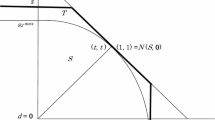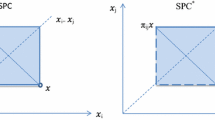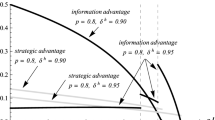Abstract
Why is issue-by-issue bargaining a common phenomenon, even though it disallows the beneficial trade-offs across issues that are possible when negotiating a global solution? We show that under asymmetric information, issue-by-issue bargaining has two attractive features. First, it avoids bundling a good deal on one issue with a bad deal on another issue, when the lack of gains to agreement on the latter is not a priori common knowledge. Second, it avoids the imposition of the asymmetric information inefficiency of “harder” issues on issues which turn to be “easier” to solve. That’s why when the agenda is not imposed on the parties but is rather left for them to determine when negotiating, they may very well opt for issue-by-issue bargaining. We demonstrate this in a natural game where bargainers communicate, whenever they choose to do so, their willingness to discuss or make offers either on one of the issues or on a bundle of issues.
Similar content being viewed by others
References
Admati AR, Perry M (1987) Strategic delay in bargaining. Rev Econ Stud 54:345–364
Bac M, Raff H (1996) Issue by issue negotiations: the role of information and time preference. Games Econ Behav 13:125–134
Busch L-A, Horstmann I (1997a) Bargaining frictions, bargaining procedures and implied costs in multiple-issue bargaining. Economica 64:669–680
Busch L-A, Horstmann I (1997b) A comment on issue by issue negotiations. Games Econ Behav 19:144–148
Busch L-A, Horstmann I (1999) Signaling via an agenda in multi-issue bargaining with incomplete information. Econ Theory 13:561–575
Chen MK (2006) Agendas in multi-issue bargaining: when to sweat the small Stuff, mimeo
Cohn Z (2004) A note on linked bargaining, mimeo
Copic J, Ponsati C (2006) Ex-post constrained-efficient bilateral trade with risk-averse traders, mimeo
Cramton PC (1992) Strategic delay in bargaining with two-sided uncertainty. Rev Econ Stud 59:205–225
Fershtman C (1990) The importance of the agenda in bargaining. Games Econ Behav 2:224–238
Inderst R (2000) Multi-issue bargaining with endogenous agenda. Games Econ Behav 30:64–82
In Y, Serrano R (2004) Agenda restrictions in multi-issue bargaining. J Econ Behav Organ 53: 385–398
Jackson MO, Sonnenschein HF (2006) Overcoming incentive constraints by linking decisions. Econometrica (in press)
John R, Raith MG (2001) Optimizing multi-stage negotiations. J Econ Behav Organ 45:155–173
Kalai E (1977) Proportional solutions to bargaining situations: interpersonal utility comparisons. Econometrica 45:1623–1630
Myerson RB, Satterthwaite MA (1983) Efficient mechanism for bilateral trading. J Econ Theory 29:265–281
O’Neill B, Samet D, Wiener Z, Winter E (2004) Bargaining with an Agenda. Games Econ Behav 48:139–153
Ponsati C, Watson J (1997) Multiple-issue bargaining and axiomatic solutions. Int J Game Theory 26:501–524
Raiffa H (1982) The art and science of negotiation. Harvard University Press, Cambridge
Wang R (2000) Separating equilibria in a continuous-time bargaining model with two-sided uncertainty. Int J Game Theory 29:229–240
Author information
Authors and Affiliations
Corresponding author
Additional information
Support from the Hammer fund for Economic Cooperation to Aviad Heifetz is gratefully acknowledged.
Support from Projects CIT-2-CT-2004-506084 by the European Comission and SEJ2006-02079 by MEC, and from CREA-Barcelona Economics to Clara Ponsati is gratefully acknowledged.
Rights and permissions
About this article
Cite this article
Heifetz, A., Ponsati, C. All in good time. Int J Game Theory 35, 521–538 (2007). https://doi.org/10.1007/s00182-006-0065-y
Accepted:
Published:
Issue Date:
DOI: https://doi.org/10.1007/s00182-006-0065-y




